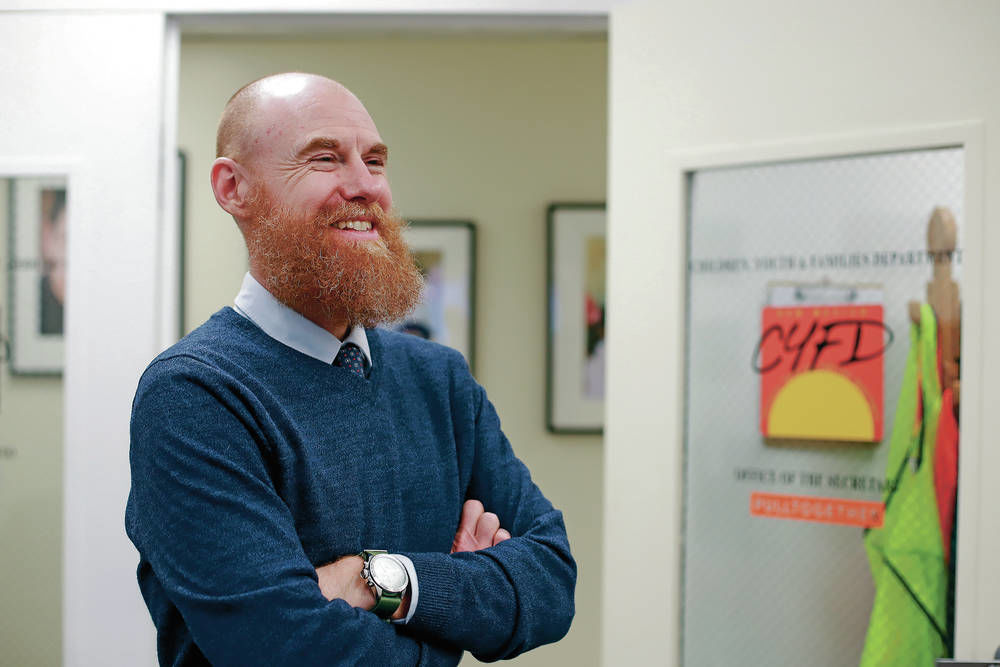
Gabriela Campos/New Mexican file photo
Children, Youth and Families Department Cabinet Secretary, here in a February 2019 file photo, says the department will become trauma responsive.
New Mexico’s already low performance in child welfare hit rock bottom on Sept. 22, 2018: Thirteen foster youth, represented by Disability Rights New Mexico and the Native American Disability Law Center, filed a federal district court suit against the Children, Youth and Families Department (CYFD) and the New Mexico Human Services Department (HSD).
Kevin S. v. Jacobson alleged that the state’s child protective services department systematically retraumatized youth in care. According to court documents, New Mexico’s broken child welfare system made life much worse for foster youth such as Diana D., an enrolled member of the Navajo Nation who had experienced some of the worst trauma imaginable, including sexual abuse by an older brother.
The suit was not only settled out of court but both the plaintiffs and state child welfare officials announced on March 25 that they had worked together to design foster care reforms that may prove to be revolutionary.
The resolution institutes a comprehensive “trauma-responsive system” for youth in care and includes early screenings for trauma, safe and long-term placements with families and a commitment to build the state’s decimated behavioral health care network. CYFD calls the reforms — which also emphasizes cultural considerations for Native American youth in care — the first of its kind in the nation. If successful, child welfare advocates say other states could follow the lead of New Mexico, which plans to move forward with the overhauls despite COVID-19 concerns.
CYFD Cabinet Secretary Brian Blalock says systematic reforms had already been in the works and that the legal truce is a manifestation of CYFD’s strategic plan to improve the lives of New Mexico’s downtrodden kids and families. “I appreciate that the plaintiffs were willing to work with us and help us get there,” Blalock said.
“Usually when a lawsuit happens, you spend a lot of time trying to get to the point where you trust each other enough to get to a settlement. In a lot of places, you never get to that point,” said Blalock, formerly a lawyer in the San Francisco Bay Area. “Here, we did. I think that’s one of the most groundbreaking pieces of the settlement.”
Behavioral health system would be rebuilt
Kevin S. v. Jacobson was one of the elephants in the room when Blalock, an appointee of Gov. Michelle Lujan Grisham, took over as CYFD leader in January 2019. The Annie E. Casey Foundation’s annual Kids Count, which has routinely ranked New Mexico at the bottom of the country for overall child well-being, was another.
The complaint, which named then-CYFD leader Monique Jacobson and former HSD Secretary Brent Earnest as culpable parties, focused on four grievances, ranging from traumatizing short-term placements for youth in care to the violation of five federal laws, including the Medicaid Act and Indian Child Welfare Act (ICWA). When settlement talks began in earnest in the middle of 2019, CYFD had already made headway on the complaints, Blalock said.
“We’d already gotten so much done that directly impacted those four claims. That generated a lot of goodwill and trust on their side,” Blalock said. “Then we were really talking about timeline and process and what it meant.”
The settlement agreement aims to rebuild the state’s behavioral health system, which critics say has been in a freefall since 2013 when then-Gov. Susana Martinez eliminated Medicaid payments to private behavioral health providers. Additionally, children who enter into state custody will be immediately screened for trauma in order to determine the best treatment plan for the youth.
[Related: COVID-19 Adds to Woes of Homeless New Mexican Youth Who Age Out of Foster Care]
[Related: Year-old Las Cruces Shelter for Homeless Youth Newly Challenged by Coronavirus]
[Related: Homeless Youth in Northern New Mexico the Focus of 2-Year Project]
[Related: COVID-19 Changes in Eddy County Mean Fewer Referrals, More Donations]
The pact also syncs with the needs of Native American children with additional attention to Indian Child Welfare Act (ICWA) compliance, which can help foster youth like Diana D. The lawsuit had charged that Diana D. moved through 11 different foster care placements and that none of them aligned with ICWA. New Mexico opened its first ICWA court in January.
‘Imbued with Trauma Responsiveness’
The settlement also focuses on building a “trauma-responsive” system rather than a “trauma-informed” network.
The latter practice, which has been integrated into some nationwide foster care systems, adopts a heightened awareness of how trauma manifests for young people, especially for those in child welfare systems who have experienced a significant amount of trauma. The former takes it beyond that, Blalock says.
“Originally in the complaint, it talked about trauma informed. Early on in the negotiation process, we said trauma informed is cool, but we’re going further than that,” he said. “Why don’t we say that our entire system is imbued with trauma responsiveness?
“A trauma responsive system is versed in exactly how to engage with young people to help them build resiliency factors so that they can transition to a successful independent adulthood,” Blalock said. Trainings, resources and baseline expectations for those involved are examples of how a trauma-responsive network can help children overcome their Adverse Childhood Experiences (ACEs), he said.
Youth in care may also benefit from some of the other terms of the settlement agreement, which includes additional training supervision and support for CYFD staff, foster parents and other adults who serve children impacted by trauma.
The state’s former practice of sending foster youth to out-of-state treatment facilities will end, according to the terms. Instead, youth in care will live in long-term placements in New Mexico and with relatives when possible.
“We think that if we implement these reforms, we’ll see much better outcomes for kids in the state of New Mexico,” Blalock said. “We’ll see if it moves the meter.”
This story is part of a Youth Today project on foster care in New Mexico. It’s made possible in part by the May and Stanley Smith Charitable Trust. Youth Today is solely responsible for the content and maintains editorial independence.





























